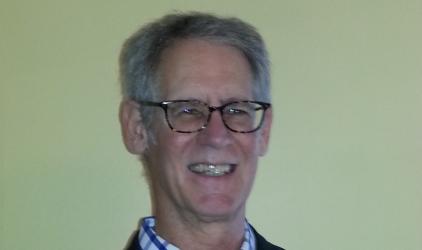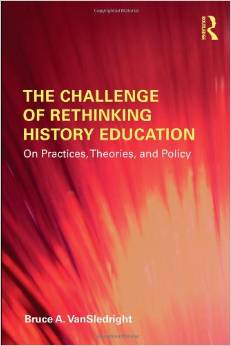So What are Your Epistemic Beliefs About History Anyway? (Bruce VanSledright)

You can gather information about a particular historical event up to a certain point, but depending on the documents you pick or the people that you talk to, there will always be bias, I guess...
This explanation came from an experienced history teacher responding to a question one of my students asked about where historical knowledge comes from and how its knowledge claims are warranted. Such questions stem from my recent research program that focused on how the epistemic beliefs of college students and practicing history teachers shape how they think about the nature of history and its knowledge claims, and for teachers in particular, how those beliefs influence their practices.
In my efforts to better understand how people learn to understand the past, epistemic beliefs about the nature of historical knowledge loom large as a substantive influence. In my early studies of young children, most appeared to think the past and history were the same thing, that one needed only to consider objects from the past and they would reveal history as it actually happened. Yet in the presence of conflicting testimonies about an event in the past, these children were stumped and history ground to a halt. The past became virtually incomprehensible. They often shrugged their shoulders in resignation about what to do next.
With young children, this might not come as much of a surprise. However, some history majors and experienced history teachers I studied manifested similar beliefs and confronted the same problem of making sense of a perspectives-laced past and the histories that flowed from it. Their resignation—or sometimes indifference and/or consternation—in its face was a bit more disconcerting. Perhaps a bit of all three is in the opening teachers’ quote, especially where her voice trails off.
It made sense to ask, how would history teachers, for example, actually deal with such conflicting testimonies in class? What strategies would they employ if students held strongly to ideas about past events that were at odds with the official history they were charged to teach? I typically saw two responses among teachers in the classes I observed: brushing the problem under the proverbial desk (i.e., ignoring the issue; changing the subject), or making a distinction between real historical facts and people’s generally entitled, but subjective (groundless?) opinions, the latter of which most peoples’ ideas were surmised to belong. One could transcend the problem by focusing on real facts and dismissing mere opinions because of their inherent biases. How this was to be accomplished exactly was seldom clear.
 The empirical work I’ve done more recently with colleagues Liliana Maggioni and Kimberly Reddy allowed us to make sense of this epistemic-beliefs issue as one in which actually doing history—that is, trying to understand what happened in the past, how people acted, how they understood themselves in those contexts, and why—plunges investigators into concerns over interpretation. How much interpretive license can be taken? If we look for hard facts and trust objects from the past to reveal history clearly (naïve objectivism), often we don’t get very far. On the other hand, if we resign ourselves as subjective inquirers to history’s frequent indeterminancies, then it seems we are left with a form of naïve subjectivism (one biased interpretive opinion is as good as another).
The empirical work I’ve done more recently with colleagues Liliana Maggioni and Kimberly Reddy allowed us to make sense of this epistemic-beliefs issue as one in which actually doing history—that is, trying to understand what happened in the past, how people acted, how they understood themselves in those contexts, and why—plunges investigators into concerns over interpretation. How much interpretive license can be taken? If we look for hard facts and trust objects from the past to reveal history clearly (naïve objectivism), often we don’t get very far. On the other hand, if we resign ourselves as subjective inquirers to history’s frequent indeterminancies, then it seems we are left with a form of naïve subjectivism (one biased interpretive opinion is as good as another).
We witnessed vacillation between these two epistemic-belief poles in history classes and in the utterances of college students. Coordinating the role of the knower (subject) with what could be known (from the objects), and therefore claimed as knowledge about the past, appeared illusive. Criteria and methods for arbitrating interpretive license seemed absent. Our data showed that prospective and practicing teachers wobbled epistemically. Doing history then stopped. Because of this impasse, many practicing teachers dropped the investigative effort from their pedagogical repertoires.
Much research on historical thinking over the last three decades has championed the importance of doing history as a vehicle for deepening understanding. But to cultivate thinking by doing history appears to require some upfront epistemic clarity, some form of criteria and methods-infused guidelines for dealing with the question of interpretive license. But what approaches will lead us there? Who is best equipped to do this work? Under what circumstances: in teacher preparation, history courses, ongoing professional development contexts—all three? From where I sit, this area of epistemic beliefs in history seems significantly under-researched, and might benefit from more concerted attention if we wish to see a continued evolution toward doing history as the primary means by which young learners deepen their understandings of the past. A recent example of this work is an article I co-authored with Kimberly Reddy, “Changing epistemic beliefs? An exploratory study of cognition among prospective history teachers,” Tempo e Argumento, 6 (11) (2014): 28-68.
- Se connecter ou créer un compte pour soumettre des commentaires
- Français

